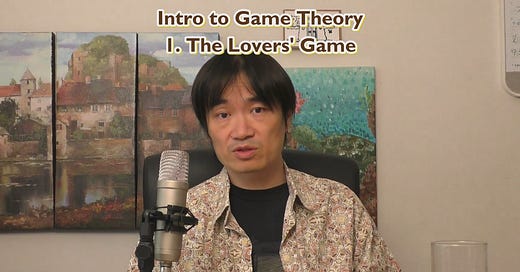In response to viewers' requests from TikTok, I will be making some more nerdy content, in addition to the normal political rants.
Raw script:
I was pretty excited when someone in the DM asked me to talk about Game Theory. This is one of the few subjects in grad school that changed my worldview. I was already in my 30s, btw. The best part about learning game theory is that you will realize a lot of strange human behavior is actually pretty logical. So a bad choice may not result from people’s dumbness or some deeper psychological problems. Sometimes it was simply because the games they find themselves in limit their choices. You probably heard of the prisoners’ dilemma, right? When both players choose their strategy rationally and logically, the outcome will be bad for both of them. You can’t blame the prisoners for being dumb. They are both perfectly rational. To avoid the bad outcome, you have to find a way to change the game, not the people. But as the first video on this topic, I want to talk about a model even simpler than the prisoners’ dilemma, which is also related to the ongoing events.
I want to show you this neat little scenario called the “coordination game”. Sometimes people call it the lovers’ game because the players normally have a lot of common interests, but they also have slightly different preferences.
For example, two people have to decide where to go for their next date. In some older text books, they use those super gender-affirming examples. Like the man wanted to go see a boxing. And the lady wants to go to see a ballet. I hate those examples. Let’s just make it more gender-neutral. Say the guy wants to go to a theatre, and the lady wants to go to a park. Let’s say it’s the 90s and they don’t have cell phones.
So for both of them, the important thing is to spend time with each other. If they go somewhere alone, whether it’s a theatre or a park, their payoff will be zero. Payoff just means the satisfaction you derive from certain activities. Game theory assumes that we can quantify each payoff into specific numbers. So, if they end up in different places, their payoff will be zero.
And, if they both go to the theatre, the guy has a payoff of 5, the lady has a payoff of 4. If they go to the park, the lady has 5 and the guy has 4.
If for some reason, they have no way to communicate. You may find it weird if you’re young and grew up with a cell phone, but back in my days when my wife and I were dating, we always had trouble finding each other, like we would wait at different exits of the subway or different McDonald’s. So this model was pretty relatable.
As you can see, if they don’t have any information about the other person’s plan, there is a good chance that they will fail the game and end up in different places. Maybe you think, “It’s easy, I’ll just go to the place the other person likes.” But what if the other person thinks the same way, right? There’s no way for you to know for sure.
For 2 people, it may not be a big deal, but what if a thousand people want to gather and protest something? If they fail to show up in the same place at the same time, it won’t work. Not only it won’t work, but they may get arrested or even beaten up. That’s also a kind of lovers’ game. The participants may have different preferences about where they want to protest, but the most important thing for them is to go to the same place.
Some games have even higher stakes. Let’s say, the power transition of a country. Say, if a powerful king died without a son. Now he has a daughter from an extramarital affair, and he also has a nephew who has some royal blood. You know, the Game of Thrones stuff. Now the generals and nobles have to decide who they want to fall in line with. If they fail to coordinate and decide to support different successors, that normally means a bloody civil war. Those nobles may have different preferences. But they will all be better off if they can converge on the same successor. That’s a lovers’ game, too.
There are so many examples like this. Sometimes, people have common interests, but they don’t have enough information about other people’s strategies, so they fail the game by choosing different strategies.
In these games, your best strategy is not what you like best, but what you expect other players to do. Your strategy doesn’t depend on your preference, or anyone’s preference, but depends on your expectations. So the players will be better off if they can find a signal to converge their expectations.
In the dating example, if the couple establishes a pattern of behavior, it can help them find each other. Let’s say, if they never go to the same place twice in a row, that pattern can help narrow down the options. Also, maybe the theater happens to be screening a movie that both of them are interested in. That can serve as a signal. A signal that helps players converge their expectations is called a “focal point”. In a high-stakes game, a focal point may be the difference between life and death.
In the protest example, sometimes, a famous person can serve as a focal point. Let’s say, if a guy with 200 million followers on TikTok says something like, “let’s gather in front of the city hall on Saturday.” That’s a strong signal. This person may not be very involved in the movement, and people may not even like his idea that much, but the protesters will go there anyway because his post serves as a focal point. It’s a piece of information that can help you estimate other people’s behavior simply because of the sheer number of people it reaches. This is why most dictatorships put the influencers on a short leash so they don’t say something and become the focal points of a protest.
And in the power succession example, having some sort of a constitution will help. If people can simply look up the document and see who’s next in line, there will be less conflict. And of course, having fair elections is an even better idea because it offers a clear numerical base for the succession. Well, of course, none of these methods is clear-cut. There will always be controversy. But having a focal point makes a government more stable. There is a line in Game of Thrones saying that “power resides where people believe it resides.” That’s basically a game theory prediction, right? You obey a government not because you like it, but because you expect other people to obey it and you don’t want to be on the opposite side. The moment that expectation collapses, you will stop taking that government seriously. It’s that simple.
So that was a quick summary of the coordination game. Next time I’ll talk about the prisoners’ dilemma and the tragedy of the commons.












Share this post